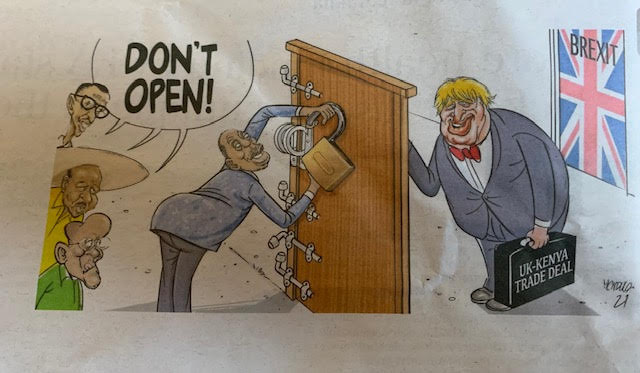UK-Kenya trade deal in jeopardy as mood in Nairobi turns outright hostile

The future of the recently signed trade agreement between the UK and Kenya seems increasingly uncertain as MPs and a group of farmers in Nairobi are threatening to shoot down the pact.
Yesterday, multiple Kenyan lawmakers came out against the trade deal, saying the agreement is ‘illegal’ under Kenyan law, while a collective of farmers have gone to court, demanding that quotes and tariffs are not lifted for British exporters into Kenya as it would lead to unfair competition and market disruption.
The UK-Kenyan Economic Partnership Agreement (EPA) was signed in London in December of last year. The deal provides Kenyan businesses duty-free access to the UK market, while Kenya will start phasing out duty and quota barriers on a set number of UK products 12 years after the EPA has come into force.
Also, tariffs on some UK goods would be reduced seven years after the deal has been ratified.
Ultimately, the deal will be extended to Burundi, Uganda, Rwanda, South Sudan and Tanzania, as City A.M. reported earlier this week.
However, a growing number of Kenyan MPs have no intention to ratify the EPA.
Lawmaker Cate Waruguru, who is vice-chair of Kenya’s influential agriculture commission, told Nairobi newspaper Daily Nation yesterday that “the mood of the house is very hostile, we don’t trust the UK. We need a number of negotiations to clarify a lot of issues.”
Another parliamentarian, Jude Njomo, called the EPA “illegal”, because pagraph 16.1 of the trade agreement bars lawmakers from either amending or scrapping parts of the agreement.
By not being allowed to change the EPA, MPs argue the document violates the country’s 2012 Treaty Making Act, which gives Kenya’s parliament the final say over any trade deal with another country.
Meanwhile, John Kiarie MP, a relatively well-known politician in Kenya, told multiple media outlets yesterday that his country would “slide back to the colonial period if the treaty were to be ratified. I mean, who really benefits in this agreement?”
In London, however, the House of Lords gave its approval to the agreement yesterday, removing the final hurdle for ratification on the side of the UK.
Only two weeks ago, the upper house said it needed more time to approve the agreement amid concerns the UK government had not addressed the potential impact of the pact on regional cohesion in the East Africa region.
Legal challenge
Despite the ratification process having been completed on the UK side, the agreement faces another obstacle south of the Sahara, as a group of farmers and lobby group Econews launched a petition at the Nairobi High Court earlier this week, which legal observers have said has the potential to drag on for months.
The farmers claim that opening up the Kenyan market to UK products – without quotas and tariffs – is a violation of their rights and freedoms under articles 35 and 43 of the Kenyan constitution.
The UK is a major market for British and Kenyan exporters of tea, coffee, flowers and fresh vegetables.
Both the UK and Kenyan governments stressed in December that the trade deal provides Kenyan businesses duty-free access to the UK market, aimed at supporting jobs and economic development in Kenya, as well as to avoid disruption to UK businesses as they maintain tariff-free supply routes for Kenya’s high-quality flowers.
They also said that the Cabinet secretary responsible for the deal, Betty Maina, who signed the trade pact in London in December with Britain’s international trade minister Ranil Jayawardena, is breaking the law by trying to rush through the EPA without proper scrutiny and any public consultation.
UK-Kenya trade
According to UK government data, the biggest import to the UK from Kenya in 2019 were, coffee and spices, with a market value of around £121m, vegetables at £79m as well as live trees and plants, mostly flowers, for around £54m.
The UK market accounts for 43 per cent of total exports of vegetables from Kenya as well as at least 9 per cent of its cut flowers. In 2019, UK-Kenya trade was worth an estimated £1.4bn.
When approached by City A.M. this morning, the office of Cabinet Secretary Betty Maina declined to comment. It’s unclear at this stage when the trade pact will be discussed or voted on in the Kenyan parliament, nor when the Nairobi High Court will process the filed petition.